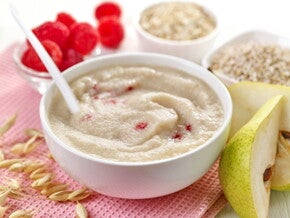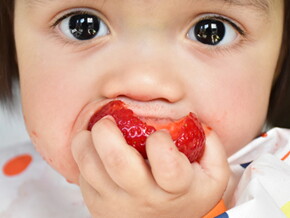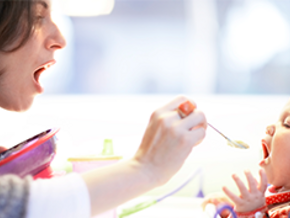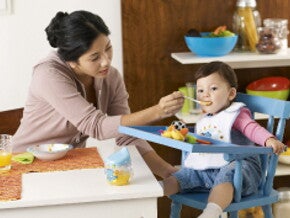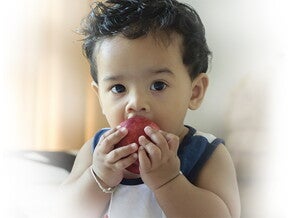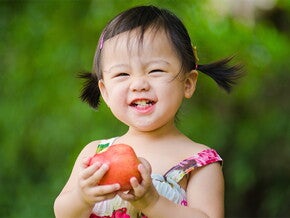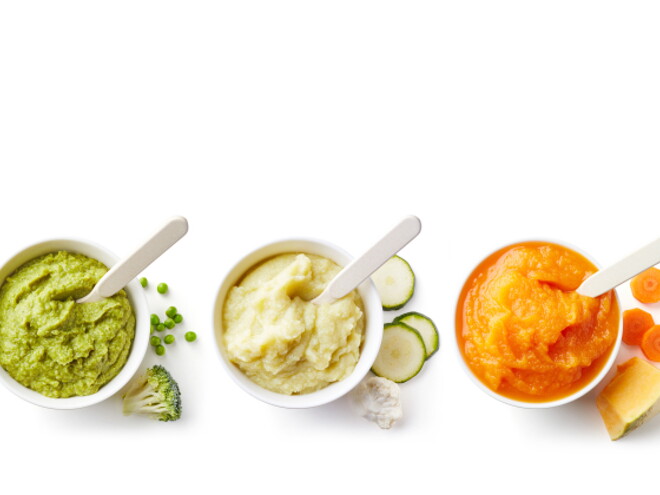
How to start complementary feeding
Starting complementary feeding is an exciting time. Here our top tips on how and when to start little children’s food from our resident dietitian.
Tips
- Wait until around six months as your child will need good eye, hand, and mouth coordination. Check your child is able to stay in a sitting position and hold their head steady.
- Whether you decide to start on pureed food, finger foods (also known as child-led weaning) or a combination of both — variety is key, so your little one gets the nutrients they need.
- Feed your child on solid food only once a day initially, gradually increase the amount and variety of food, being responsive to junior’s cues.
- A rough guideline is to start with about 5–10 teaspoons of food (about 30g) at one meal. You can then increase it to two meals a day, and then up to three meals per day.
- For the first feed make sure junior isn’t tired — it may take a while for them to get used to food from a spoon, so patience is key.
- Your child is hungrier and more alert first thing, so it’s a good time to try new foods.
- Sit junior upright in a highchair with no distractions, like TV, mobiles or tablets.
- Give them a little of their usual milk first to relax them and take the edge off their hunger.
- For the first feed, try pureed vegetables. There is recent evidence that weaning with veggies helps set up healthy food preferences later on, let’s hope so!
- Try to introduce a new single bitter vegetable every day for one week, for examples broccoli, parsnip, beetroot, or zucchini. Keep a camera ready — you may get some funny faces.
- Repeat this process for the second week to get junior used to bitter vegetables.
- Remember it can take up to eight tries for your child to accept a new flavor so don’t give up!
- Keep a feeding schedule stuck on the fridge to track what your child has tried, and how often.
- Only try one new food at a time. You can combine flavours after a couple of weeks once you know they’re a hit.
- Praise junior when they try something new.
- Your child’s complementary feeding diet should include the essential food groups — fruits, vegetables, grains and starchy foods, dairy, meat, fish and protein foods, and fats.
- Variety is key to ensure little one is getting the right nutrients for growth and development, such as iron, calcium, vitamin C, vitamin A, vitamin D and omega 3 fatty acids.
- Vegetarian or vegan? Be sure to include a variety of foods such as eggs, ground nuts or seeds, soy products (tofu), cereal foods, pulses such as beans, peas and lentils to ensure they get all the nutrients they need.
- If giving junior a vegetarian or vegan diet they may need additional supplements, so speak to your healthcare provider (HCP) for advice.
- Little children can eat nuts from about six months as long as they are crushed or finely ground. If your child has eczema or you have a history of allergies in your family speak to your HCP first.
- Foods to avoid? Whole nuts, lychees and grapes are a choking hazard — ensure they are chopped up. Pâté, raw shellfish, and mold-ripened or unpasteurized cheeses carry a small risk of food poisoning so are not suitable under the age of two.
- Be a good role model. Little children are curious so if you’re enjoying food on your plate, they are likely to be more eager to have some.
- Remember, at 6-8 months, two thirds of your child’s calories will still come from breast milk or formula. So think about quality over quantity with the foods you offer.
- Planning to offer finger foods? Follow our child-led weaning checklist.
Source
https://www.smababy.co.uk/baby/feeding-guide-for-babies/
https://www.smababy.co.uk/baby/weaning-babies/
https://www.smababy.co.uk/baby/stage-1-weaning/
https://www.nhs.uk/start4life/weaning/getting-ready/
https://www.nhs.uk/start4life/weaning/what-to-feed-your-baby/around-6-months/
https://www.babycentre.co.uk/a546665/preparing-first-foods
https://www.nhs.uk/conditions/pregnancy-and-baby/foods-to-avoid-giving-babies-and-young-children/


















